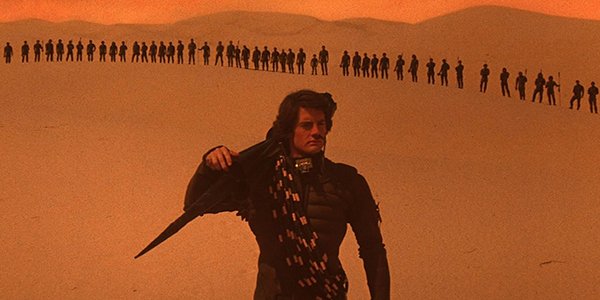How Big Of A Financial Gamble Is Dune?

Your Daily Blend of Entertainment News
You are now subscribed
Your newsletter sign-up was successful
The last couple months have been packed with casting updates for Denis Velleneuve’s Dune. The film has already put together one of the best casts in recent memory, rivaling Quentin Tarantino’s Once Upon a Time in Hollywood for ‘most stacked.’ So far the lineup includes (takes deep breath) Timothée Chalamet, Rebecca Ferguson, Josh Brolin, Zendaya, Oscar Isaac, Dave Bautista, Javier Bardem, Jason Momoa, Stellan Skarsgård, Charlotte Rampling and David Dastmalchian.
That’s some major talent set to bring Frank Herbert’s 1965 novel to life on the big screen, a novel widely considered to be one of the best science fiction books of all time. The combination of that cast and story under the direction of Arrival, Sicario and Blade Runner 2049 director Denis Villeneuve has Dune shaping up to be one of 2020’s most exciting films. There is so much to like about this film, but brilliance on paper is no guarantee of success and it must be asked, how big of a financial gamble is Dune?
On the surface, a star-studded science fiction blockbuster might not seem like a huge gamble, and quality-wise, I don’t think it is. I fully expect Dune to be a fantastic and visually sumptuous epic, but the box office is a fickle beast, and how audiences will respond to something is difficult to predict.
To be fair upfront, we do not yet know how much Warner Bros. and Legendary are spending on this film, and its budget will play a huge factor in how much of a financial gamble it is. That said, if you just look at the story, which evokes Game of Thrones and Star Wars, features interstellar travel and people riding giant sandworms, it’s easy to understand why this film probably won’t be cheap. There’s a reason there aren’t many indie science fiction epics.

Most big Hollywood movies these days are based on pre-existing properties because it’s far easier to sell audiences on something that they’ve heard of or that has a built-in fanbase than an entirely new concept. That gives Dune a leg up over something like Jupiter Ascending, which was an original idea. Dune is a beloved and enduring science fiction classic, and it has also been adapted twice onscreen, first in David Lynch’s 1984 film and then later in the 2000 mini-series on the then-Sci-Fi Channel.
The name value of the property and its existing place in pop culture mitigate some of the risk for Denis Villenueve’s Dune. There is a coterie audience of Dune fans that will show up for this film no matter what. And yet, I think it is worth speculating about just how powerful the Dune brand is.
A long 35 years will separate this new film from David Lynch’s Dune in 1984, and that film was no smash, earning $30.9 million on a $40 million budget. This isn’t like 2020’s return of Ghostbusters, for which the original 1984 film earned $295.2 million worldwide and became an adored cinematic classic. The original Dune film is a cult classic at best, and while the Sci-Fi Channel mini-series did well in the ratings, that was nearly two decades ago. Turning on the TV vs. going to the theater and paying for a ticket are two very different things.
Your Daily Blend of Entertainment News
Still though, Dune’s limited cultural cachet does not doom it. A Song of Ice and Fire was just a series of books loved by fantasy readers before Game of Thrones took the world by storm. Moreover, films with no head start provided by source material can still succeed. James Cameron’s Avatar had no source material and remains the biggest movie ever.
And yet, Dune’s story in particular feels like it could run into the same kind of apathy that befell another film, Disney’s John Carter. That film was based on the stories of Edgar Rice Burroughs (stories Dune probably took a few cues from) and was also about the violent political affairs on a desert planet. John Carter wound up being one of the most storied flops in recent memory, earning only $284.1 million on its wildly expensive $250 million production budget.

Admittedly, John Carter suffered from an atrocious marketing campaign, but it was still a big budget, flashy blockbuster from a studio with a great batting average. Despite that, audiences didn’t respond to it. Perhaps it didn’t look interesting or perhaps it seemed too derivative, which is ironic because many of the stories it could be compared to were actually inspired by that source material. The same could be said for Dune.
Therefore, it is reasonable to wonder if there will be a bit of an unfair ‘been there, done that’ attitude among general audiences about this film, or a feeling that they don’t know what this is or why they should see it, a la Valerian and the City of a Thousand Planets. Needless to say, the marketing will be super important to this film’s success.
Speaking of general audiences, Dune’s director, the very element of this movie that makes me excited for it, is also the thing that gives me pause about its financial viability. Since he really came on the scene with 2013’s Prisoners, Denis Villeneuve hasn’t exactly been known for making four-quadrant movies.
That isn’t a knock against him, but the challenging nature of his films means they don’t have the kind of accessibility that is generally associated with successful blockbusters. Although the same could be said of Christopher Nolan’s films and he has somehow still managed to find success with complex, big-budget original films.

Denis Villeneuve’s only big budget film thus far was the R-rated, 2 hour and 44 minute Blade Runner 2049, which disappointed at the box office despite being a critical win, earning $259.2 million on a budget of at least $150 million. The more modestly budgeted PG-13 Arrival, however, was a success financially.
The story of Dune means it could probably go either way as far as rating is concerned. Denis Villeneuve has primarily worked in the R realm, but he was successful with Arrival at PG-13, and David Lynch’s Dune was also PG-13. Villeneuve has said though that his Dune will be "Star Wars for adults," so we’ll see if that means an R rating or not because those kids movies certainly make a lot of money. The rating it ends up with will definitely play a role in how much of a gamble this film winds up being.
Lastly, it is worth mentioning that Denis Villeneuve has said the plan is for Dune to be split into two feature films rather than jam Frank Herbert’s novel into one feature without room to breathe. While I have argued the merits of this approach, there is a degree of risk involved. If the first film isn’t successful, we might not get a second. Feeding into that possibility is that depending on how the story is split, we don’t know how general audiences will feel about only getting half of a story.
On the artistic front, Dune feels like one of the safest bets on the calendar given the talent involved and the source material. And maybe the sheer star power will get people in the theater. But based on what we know right now, I do think this film could be a big financial gamble.
Nevertheless, there is always some degree of risk involved in any film. Fear is the mind-killer, and if fear of failure were the sole arbiter of what films got made, this would be a very boring art form. The greater the risk, the greater the reward, and a good story well told should prevail. Here’s hoping that Dune does just that.
Dune opens in theaters on November 20, 2020. For movies arriving a little sooner, check out our 2019 release schedule.
Nick grew up in Maryland has degrees in Film Studies and Communications. His life goal is to walk the earth, meet people and get into adventures. He’s also still looking for The Adventures of Pete and Pete season 3 on DVD if anyone has a lead.

